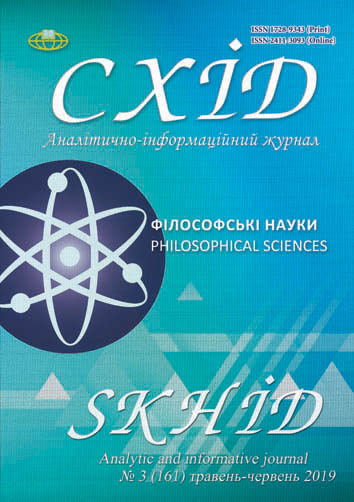Creativity as a way of being of a nation (persinalistic aspect)
DOI:
https://doi.org/10.21847/1728-9343.2019.3(161).171931Keywords:
creativity, person, nation, nationalityAbstract
The article is devoted to the analysis of the problem of connection between the creative and national aspects in the dimension of the being of the person and the community in the context of national intellectual discourse, which is actual in view of the new wave of existential crisis experienced by modern man. The idea of creativity as an uninterrupted continuum of being of the nation is represented by the concepts of well-known cultural and public figures of the Ukrainian diaspora of the 20th century who represented various fields: cultural studies, study of literature and literary form was represented by Ye.F. Malaniuk, pedagogical and literary forms - by H.H. Vashchenko, church-religious, theological and journalism studies - by S. Yarmus, art studies and art form - by B. Stebelskyi. It is proved that formed on the basis of cordocentric worldview paradigm and, therefore, personalistically and existentially preconditioned, the Ukrainian intellectual thought about the awareness of the ethical value of a person prevailing in Ukrainian ideology is extrapolated from the individual to the ethno-national community. Thus, a nation is regarded as a person. Since personalism implies an active and creative attitude to the world and considers a person as a creative element and a constitutive feature, it is natural that in the context of considering a nation as a common person the problem of ontological communication between the creative and the national one appears. During the last century, Ukrainian intellectual discourse had shaped the idea that the deep psychological needs of the human person are satisfied through creativity, which also justifies its God-likeness, the unique soul of the people is manifested, and most importantly, the spiritual association of all generations of the nation into a holistic personal community is implemented. The author marks the historiosophical concept of Yevhen Malaniuk, who considers the denationalization of the creative sphere of the Eurasian cultural space, which, in turn, led to its depersonalization, the main cause of the crisis of contemporary art. Therefore, within the limits of the examined intellectual discourse the following thought is outlined: the loss of a personal relationship between a creative person and a nation not only leads to a crisis of art and crisis of a personality, but also threatens the existence of a nation. This gives reasons to consider creativity as a way of existence of the nation.Downloads
References
Berdyaev, N. A. (2003). Sudba cheloveka v sovremennom mire: K ponimaniyu nashey epokhi. In: Dukh i realnost. Moscow: АSТ; Kharkiv: Folio, pp. 157-226. (In Russian)
Vashchenko, H. H. (1976). Vykhovnyy ideal: Pidruchnyk dlya Vykhovnykiv, Uchyteliv i ukrayinskykh Rodyn. Ed.2. Brussels - Toronto - New York - Munich: Publishing of the Central Executive Committee of the Ukrainian Youth Union, 209 p. (In Ukrainian)
Krymskyy, S. B.; Popovych, M.V. (ed.) (2006). Arkhetypy ukrayinskoyi mentalnosti. Problemy teoriyi mentalnosti. Kyiv: Naukova Dumka, pp. 273-299. (In Ukrainian)
Malaniuk, Ye. F. (1966). Tvorchist i natsionalnist. (Do problemy malorossyzmu v mystetstvi). In: Knyha sposterezhen. Vol. 2: Proza. Toronto: Homin Ukrayiny, pp. 21-38 (In Ukrainian)
Stebelskyi, B. I. (1991). Ideyi i tvorchist. Toronto: Homin Ukrayiny, 353 p. (In Ukrainian)
Tabachkovskyi, V.H. (2002). U poshukakh nevtrachenoho chasu: Narysy pro tvorchu spadshchynu ukrayinskykh filosofiv-shistdesyatnykiv. Kyiv: PARAPAN, 298 p. (In Ukrainian)
Khamitov, N. V. and Harmash, L. N. and Krylova, S. A. (2006). Istoriya filosofiyi: Problema lyudyny ta yiyi mezh In: Second edition, redrafted and enlarged. Kyiv: Naukova Dumka, 296 p. (In Ukrainian)
Khamitov, N. V. (2003). Personalism. In: Tabachkovskyi, V. H., Bulatov, M. O., Khamitov, N. V. Philosophy: The world of a man. Lecture course: Textbook. Kyiv: Lybid, pp. 222-232.
Yarmus, S. (1983). Spirituality of the Ukrainian people. Winnipeg, 227 p.
Downloads
Published
How to Cite
Issue
Section
License
Copyright (c) 2019 Richard Horban

This work is licensed under a Creative Commons Attribution-NonCommercial-NoDerivatives 4.0 International License.
1. Authors bear responsibility for the accuracy of facts, quotations, numbers and names used.
2. Manuscripts are not sent back.
3. The publisher does not always agree with the authors' opinion.
4. The authors reserve the right to authorship of the work and pass the first publication right of this work to the journal under the terms of a Creative Commons Attribution-NonCommercial-NoDerivatives 4.0 International License. This license allows others to distribute (copy) the published work for non-commercial purposes, provided there is mandatory attribution to its authors and a link to the first publication in our journal.
5. The authors have the right to conclude separate supplement agreements that relate to non-exclusive work distribution in the form in which it has been published by the journal (for example, to upload the work to the online storage of the journal or publish it as part of a monograph), provided that the reference to the first publication of the work in this journal is included.

